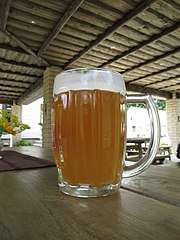Farmhouse ale
Farmhouse ale is an ancient European tradition where farmers brewed beer for consumption on the farm from their own grain. Most farmers would brew for Christmas and/or the late summer work, but in areas where they had enough grain farmers would use beer as the every-day drink. This was in a time when it was safer to drink beer than water. Farmhouse ale has enormous variation in the ingredients and brewing process used, both of which follow ancient local traditions.

Today many microbreweries make beers they market as farmhouse ale, but in most cases the connection with the actual farmhouse brewing tradition is rather tenuous. In Finland, Estonia, and Lithuania, however, there are commercial farmhouse breweries that brew on the farm according to the ancient traditions. Some of these still have the original farmhouse yeast.
In Belgium and Northern France there are breweries making beers that are thought to derive from beers traditionally brewed on the farms in these areas, but the connection is not well documented, and it's not clear how close the commercial beers are to the farmhouse-brewed originals.
Varieties
Many countries have their own variant:
- Norway: Several styles collectively known as maltøl[2]
- Belgium: Saison and Grisette
- Finland: Sahti
- France: Bière de Garde
- Sweden: Gotlandsdricka
There are other farmhouse ales such as
References
- Pihtla õlu. Traditional Saaremaa beer.
- Maltøl, or Norwegian farmhouse ale, Beer, 2014-10-11
- Brewing: In Estonia, a Farmhouse Tradition Survives, Martin Thibault, BeerAdvocate Magazine, Oct 2016
- Lithuanian beer - a rough guide, Lars Marius Garshol, 2014, ISBN 978-1502738523